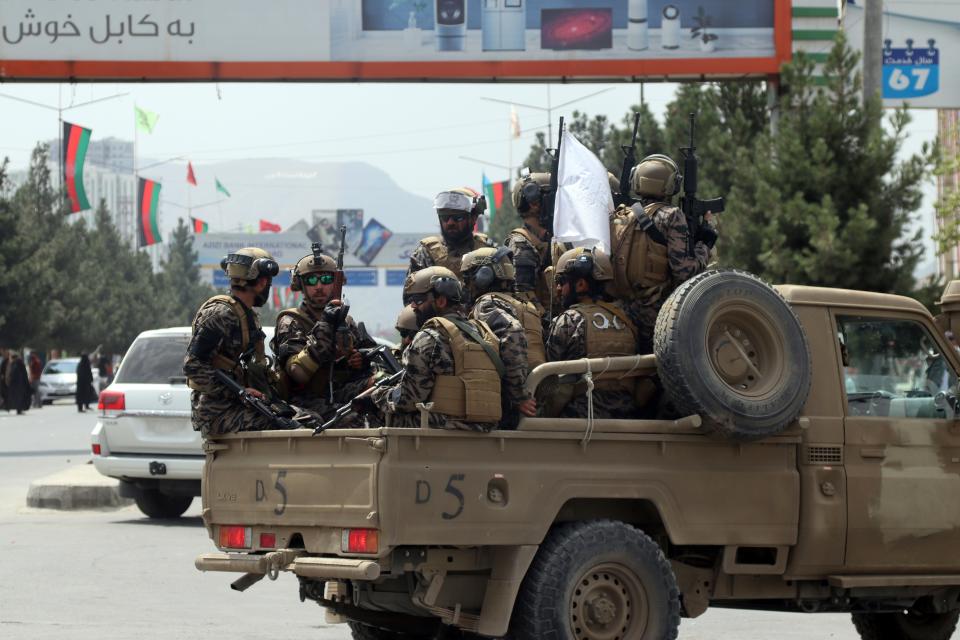'Surreal': Marine sniper describes attack that killed 183 during US withdrawal from Afghanistan
- Oops!Something went wrong.Please try again later.
WASHINGTON – A Marine Corps sniper stationed at the Kabul airport the day of a deadly suicide attack wept on Wednesday as he described in horrific detail the chaos and bloodshed surrounding the U.S. military’s hectic withdrawal in the final hours of the war in Afghanistan.
Sgt. Tyler Vargas-Andrews, who was seriously wounded in the attack, described the scene at the airport as “surreal,” with hundreds of Afghans rushing toward the airport gate in a frantic attempt to flee the brutal Taliban regime.
Many suffered from severe malnutrition. Infants were dying. Some Afghans who were turned away from the airport tried to kill themselves with the razor wire used to keep the crowds at bay.
“They thought this was merciful compared to the Taliban torture that they faced,” Vargas-Andrews said.
The devastating suicide attacks – which killed an estimated 170 Afghans and 13 U.S. troops – propelled President Joe Biden to the most perilous moment of his presidency and caused his approval ratings to plummet as Americans questioned his handling of the withdrawal from Afghanistan.

A deadly suicide attack in Afghanistan
The attacks, the swift rout of the Afghanistan’s American-backed government by Taliban insurgents and the messy withdrawal of U.S. troops brought criticism at home and from U.S. allies and called into question Biden’s campaign to restore America’s reputation abroad after four tumultuous years of Donald Trump’s presidency.
“What happened in Afghanistan was a systemic breakdown of the federal government at every level, and a stunning failure of leadership by the Biden administration,” said Rep. Michael McCaul, R-Texas, chairman of the House Foreign Affairs Committee, which is investigating Biden’s decision to bring U.S. troops home from Afghanistan and the frenzied departure that ensued
At a hearing before the committee on Wednesday, Vargas-Andrews and others recalled the disorder and confusion of the closing days of the war. A suicide bomber and gunmen attacked crowds of Afghans flocking to the Hamid Karzai International Airport amid an airlift for those fleeing the Taliban takeover on Aug. 26, 2021.
The committee’s top Democrat, Rep. Gregory Meeks of New York, said Biden made the right call in bringing troops home and ending America’s longest war.
“I can’t in good conscience imagine sending more American men and women to fight in Afghanistan,” Meeks said, adding that the war had ballooned into a nation-building exercise that lasted across four administrations.
White House spokesman Ian Sams also defended the administration's handling of the war, saying in a statement that Biden inherited a deal negotiated by Trump to withdraw all troops by spring 2021 without conditions. The Trump administration failed to put in place an evacuation plan and slowed down the processing of special visas for the U.S.'s Afghan allies, Sams said.
"Instead of returning the U.S. to active combat with the Taliban and putting even more of our troops’ lives at risk, President Biden made the tough decision to finally end the 20-year war in Afghanistan, bring our troops home and safely evacuate tens upon tens of thousands of Americans and Afghan allies," Sams said.
As a result, "we are no longer losing American lives and spending tens of billions of dollars a year fighting a war with no end in sight, putting the U.S. in a stronger position to lead the world and address the challenges of the future," Sams said.

Afghanistan withdrawal was 'a catastrophe'
Vargas-Andrews, who was part of a sniper team stationed at the airport, told the committee that, before the attack, members of his squadron spotted a man who fit the description of a suspected suicide bomber.
But when they asked their commander whether they had permission to shoot the suspect, Vargas-Andrews said, he replied, “I don’t know.” The suspect eventually disappeared into the crowd.
"To this day, we believe he was a suicide bomber,” said Vargas-Andrews, who appeared before the panel in his personal capacity and not as a representative of the Defense Department or the Marine Corps.
“Our expertise was disregarded," he added. "No one was held accountable for our safety.”
Vargas-Andrews, 25, recalled later standing near a two-foot canal at the airport, seeing a sudden flash, feeling a massive wave of pressure and being thrown to the ground. When he opened his eyes, he saw dead Marines surrounding him and his lower abdomen soaked in blood.
A team leader dragged him to safety and started applying tourniquets to his limbs. He would eventually undergo 44 surgeries and lose his right arm, his left leg, a kidney and parts of his intestines.
“The withdrawal was a catastrophe in my opinion,” Vargas-Andrews said, “and there was an inexcusable lack of accountability and negligence.”
Deadly suicide attack at Kabul airport
Aidan Gunderson, an Army medic who was also stationed at the airport the day of the attack, recalled sensing what felt like a heavy punch to his chest, looking up and seeing a large plume of smoke and debris shooting into the sky.
Marines and corpsmen fought back tears as they tried to save lives, Gunderson said.
“It was a nightmare,” he said.
As medics transported a truckload of wounded soldiers to a hospital, an injured Marine in blood-soaked pants squeezed Gunderson’s hand, looked into his eyes and said he didn’t want to die.
“I assured him that he would be fine,” Gunderson said, “but as I carried him inside, I did not know if he would survive.”
Michael Collins covers the White House. Follow him on Twitter @mcollinsNEWS.
Dig deeper
'A state of whiplash': Will turmoil in Afghanistan hurt Biden campaign to repair U.S. reputation?
Political impact: Will withdrawal from Afghanistan be a permanent stain on Biden's legacy? History says maybe not
Standing his ground: Biden praises Afghanistan evacuation, says withdrawal ends era of using military might to 'remake other countries'
'Forever war' ends: The US is out of Afghanistan. What happens next in the nation now led by the Taliban?
Starting over: Afghan refugees have found a home in Florida, hoping for a 'peaceful and calm' life
This article originally appeared on USA TODAY: Marine sniper recalls Afghanistan suicide attack during US withdrawal

